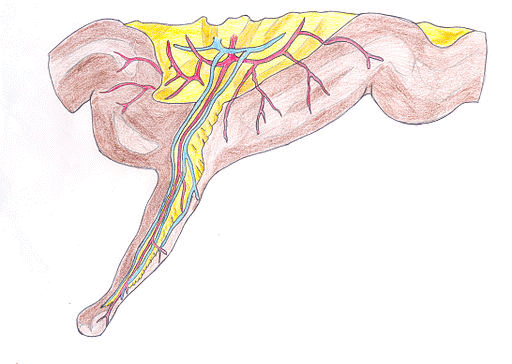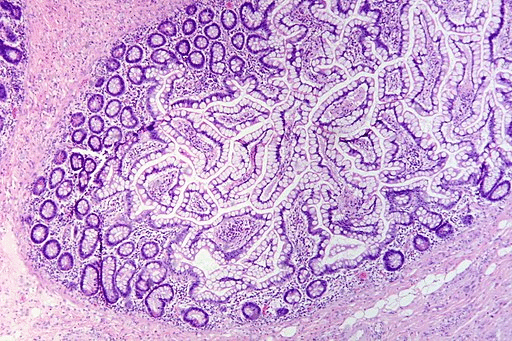Meckel's diverticulum pathophysiology: Difference between revisions
| (29 intermediate revisions by 5 users not shown) | |||
| Line 1: | Line 1: | ||
__NOTOC__ | __NOTOC__ | ||
{{Meckel's diverticulum}} | {{Meckel's diverticulum}} | ||
{{CMG}} | {{CMG}} {{AE}} {{Cherry}} | ||
==Overview== | |||
The [[vitelline duct]] or the [[Vitelline duct|omphalomesenteric duct]] is the connection between the [[midgut]] and the [[yolk sac]] responsible for providing [[nutrition]] to the [[midgut]], during [[Fetus|fetal]] development. The [[vitelline duct]] subsequently undergoes involution, in the period between the fifth and the sixth weeks of [[gestation]] while the [[Intestinal|intestinal loop]] is rapidly pulled into the [[abdominal cavity]]. Failure of [[Duct (anatomy)|duct]] involution may lead to persistence of the proximal portion of [[Vitelline duct|omphalomesenteric duct]], which may be referred to as the Meckel's diverticulum. The Meckel’s diverticulum is a true [[diverticulum]] (comprising of all layers of [[Small intestine|intestinal wall]] i.e. [[Mucous membrane|mucosa]], [[submucosa]] and [[Muscularis externa|muscularis propria]]). It arises from the antimesenteric border of the [[ileum]] and extends into the [[umbilical cord]]. The blood supply comes from the [[Vitelline arteries|vitelline artery]], which is a branch of the [[superior mesenteric artery]], prone to torsion, [[ischemia]], [[infarction]], and [[obstruction]]. The [[diverticulum]] may contain [[Ectopic|ectopic tissue]] due to the presence of a [[Pluripotency|pluripotent cell]] lining, faulty association between [[Endoderm|endodermal]] and [[Neural crest|neural crest cells]] and absence of inhibitory effect of the [[mesoderm]] on the local [[endoderm]]. | |||
==Pathophysiology== | ==Pathophysiology== | ||
[[File:Mimgif.gif|500px|center|thumb|Meckel's diverticulum <br> Source: Wikimedia commons <ref name="urlFile:Diverticule de Meckel.jpg - Wikimedia Commons">{{cite web |url=https://commons.wikimedia.org/wiki/File:Diverticule_de_Meckel.jpg |title=File:Diverticule de Meckel.jpg - Wikimedia Commons |format= |work= |accessdate=}}</ref>]] | |||
* During embryonic life, the [[vitelline duct]] or the [[Vitelline duct|omphalomesenteric duct]] is the connection between the [[midgut]] and the [[yolk sac]] responsible for providing [[nutrition]] to the [[midgut]].<ref name="urlFundamentals of Pediatric Surgery - Second Edition | Peter Mattei | Springer">{{cite web |url=http://www.springer.com/us/book/9783319274416 |title=Fundamentals of Pediatric Surgery - Second Edition | Peter Mattei | Springer |format= |work= |accessdate=}}</ref> | |||
* In the period between the fifth and the sixth weeks of gestation, the [[vitelline duct]] involutes and disappears, while the [[Intestine|bowel]] is rapidly pulled into the [[abdominal cavity]].<ref name="urlThe Developing Human - 9th Edition">{{cite web |url=https://www.elsevier.com/books/the-developing-human/moore/978-1-4377-2002-0 |title=The Developing Human - 9th Edition |format= |work= |accessdate=}}</ref> | |||
* Failure of [[Duct (anatomy)|duct]] involution may lead to persistence of the [[Vitelline duct|omphalomesenteric duct]] with variable [[morphology]]:<ref name="urlRobbins and Cotran Pathologic Basis of Disease, Professional Edition - 8th Edition">{{cite web |url=https://www.elsevier.com/books/robbins-and-cotran-pathologic-basis-of-disease-professional-edition/kumar/978-1-4377-0792-2 |title=Robbins and Cotran Pathologic Basis of Disease, Professional Edition - 8th Edition |format= |work= |accessdate=}}</ref><ref name="pmid16807577">{{cite journal |vauthors=Tiu A, Lee D |title=An unusual manifestation of Meckel's diverticulum: strangulated paraumbilical hernia |journal=N. Z. Med. J. |volume=119 |issue=1236 |pages=U2034 |year=2006 |pmid=16807577 |doi= |url=}}</ref><ref name="pmid28164005">{{cite journal |vauthors=Garg D, Singh AP, Kothari S, Kumar A |title=Urachal Cyst, Meckel's Diverticulum and Band, and Urachus |journal=APSP J Case Rep |volume=8 |issue=1 |pages=8 |year=2017 |pmid=28164005 |pmc=5253616 |doi=10.21699/ajcr.v8i1.477 |url=}}</ref> | |||
** [[Vitelline duct|Vitelline]] [[Fistula|fistula]] draining through the [[Navel|umbilicus]] | |||
** [[Vitelline duct|Vitelline]] [[Cyst|cysts]] | |||
** [[Fiber|Fibrous]] bands connecting the [[Navel|umbilicus]] to the [[diverticulum]] that may twist to cause [[Bowel obstruction|intestinal obstruction]] | |||
** Meckel’s diverticulum:<ref name="urlRobbins and Cotran Pathologic Basis of Disease, Professional Edition - 8th Edition">{{cite web |url=https://www.elsevier.com/books/robbins-and-cotran-pathologic-basis-of-disease-professional-edition/kumar/978-1-4377-0792-2 |title=Robbins and Cotran Pathologic Basis of Disease, Professional Edition - 8th Edition |format= |work= |accessdate=}}</ref><ref name="pmid7362966">{{cite journal |vauthors=Simms MH, Corkery JJ |title=Meckel's diverticulum: its association with congenital malformation and the significance of atypical morphology |journal=Br J Surg |volume=67 |issue=3 |pages=216–9 |year=1980 |pmid=7362966 |doi= |url=}}</ref><ref name="pmid11333103">{{cite journal |vauthors=Yahchouchy EK, Marano AF, Etienne JC, Fingerhut AL |title=Meckel's diverticulum |journal=J. Am. Coll. Surg. |volume=192 |issue=5 |pages=658–62 |year=2001 |pmid=11333103 |doi= |url=}}</ref><ref name="pmid17579156">{{cite journal |vauthors=Elsayes KM, Menias CO, Harvin HJ, Francis IR |title=Imaging manifestations of Meckel's diverticulum |journal=AJR Am J Roentgenol |volume=189 |issue=1 |pages=81–8 |year=2007 |pmid=17579156 |doi=10.2214/AJR.06.1257 |url=}}</ref> | |||
*** True [[diverticulum]] (comprising of all layers of intestinal wall i.e. [[Mucous membrane|mucosa]], [[submucosa]] and [[Muscularis externa|muscularis propria]]) | |||
*** Arises from the antimesenteric border of the [[ileum]], extends into the [[umbilical cord]] | |||
*** Supplied by the [[Vitelline arteries|vitelline artery]], branch of the [[Superior mesenteric artery|Superior Mesenteric Artery (SMA)]], prone to torsion and subsequent [[ischemia]], [[infarction]] and [[obstruction]] | |||
*** May contain [[Ectopic|ectopic tissue]] due to the following reasons: | |||
**** Presence of a [[Pluripotency|pluripotent cell]] lining | |||
**** Faulty association between [[Endoderm|endodermal]] and [[Neural crest|neural crest cells]] | |||
**** Absence of inhibitory effect of the [[mesoderm]] on the local [[endoderm]] may also be responsible | |||
*** Types of [[Ectopic|ectopic tissue]]: | |||
**** [[Jejunum|Jejunal mucosa]] | |||
**** [[Duodenum|Duodenal mucosa]] or [[Duodenum|Brunner's tissue]] | |||
**** [[Stomach|Gastric]] [[Mucous membrane|mucosa]] | |||
**** [[Pancreas|Pancreatic]] tissue | |||
==Genetics== | |||
*There is some evidence to suggest a [[Family|familial]] association with the development of Meckel's diverticulum, but this has not been adequately explored.<ref name="pmid2531871">{{cite journal |vauthors=Lajarrige C, Druon D, Gruss R, Delepierre A, Aina E, Chaqchaq A, Kremp L |title=[3 cases of Meckel's diverticulum in the same family] |language=French |journal=Presse Med |volume=18 |issue=39 |pages=1930 |year=1989 |pmid=2531871 |doi= |url=}}</ref> | |||
=== | ==Associated Conditions== | ||
* Presence of other [[Congenital disorder|congenital anomalies]]:<ref name="urlMeckels Diverticulum">{{cite web |url=https://www.cincinnatichildrens.org/health/m/meckels-diverticulum |title=Meckel's Diverticulum |format= |work= |accessdate=}}</ref><ref name="urlMeckel’s Diverticulum">{{cite web |url=https://www.dovemed.com/diseases-conditions/meckels-diverticulum/ |title=Meckel’s Diverticulum |format= |work= |accessdate=}}</ref> | |||
** [[Crohn's disease]] | |||
** [[Omphalocele]] | |||
** [[Esophageal atresia]] | |||
** [[Anorectal anomalies|Anorectal malformations]] such as [[imperforate anus]] | |||
** [[Neurological]] and [[Circulatory system|cardiovascular]] [[Congenital disorder|malformations]] | |||
Meckel's diverticulum | ==Gross Pathology== | ||
*On gross pathology, the features of Meckel's diverticulum are as follows: | |||
*Location: | |||
**Usually located 80cm [[Anatomical terms of location|proximal]] to the [[Ileocecal|ileocecal junction]] | |||
**Along the antimesenteric border of the [[ileum]] | |||
*Appearance: | |||
**Small pouch or a blind segment | |||
*[[Length]]: | |||
**Variable, from less than 1cm to 8cm | |||
*Size: | |||
**[[Lumen]] diameter: greater the [[ileum]] | |||
==Microscopic Pathology== | |||
[[File:Bl.gif|500px|center|thumb|Meckel's diverticulum with gastric heterotopic cell rests <br> Source: Wikimedia commons <ref name="urlFile:Meckels diverticulum with ectopic gastric mucosa and perforation, HE 1.jpg - Wikimedia Commons">{{cite web |url=https://commons.wikimedia.org/wiki/File:Meckel%27s_diverticulum_with_ectopic_gastric_mucosa_and_perforation,_HE_1.jpg |title=File:Meckel's diverticulum with ectopic gastric mucosa and perforation, HE 1.jpg - Wikimedia Commons |format= |work= |accessdate=}}</ref>]] | |||
* Microscopic pathology reveals normal [[Small intestine|small intestinal]] [[Mucous membrane|mucosa]]. | |||
* Meckel's diverticulum is a true [[diverticulum]] containing all three layers of the [[Intestine|bowel]] wall: | |||
** [[Mucous membrane|Mucosa]] | |||
** [[Submucosa]] | |||
** [[Muscularis externa|Muscularis propria]] | |||
* Heterotopic rests of other kinds of [[Mucous membrane|mucosa]] may be present: | |||
** [[Stomach|Gastric]] | |||
** [[Colon (anatomy)|Colonic]] | |||
** [[Pancreas|Pancreatic]] | |||
==References== | ==References== | ||
{{Reflist|2}} | |||
[[Category:Needs content]] | [[Category:Needs content]] | ||
[[Category:Gastroenterology]] | [[Category:Gastroenterology]] | ||
[[Category:Pediatrics]] | [[Category:Pediatrics]] | ||
[[Category:Needs overview]] | [[Category:Needs overview]] | ||
{{WS}} | |||
{{WH}} | |||
Latest revision as of 21:59, 11 January 2018
|
Meckel's diverticulum Microchapters |
|
Diagnosis |
|---|
|
Treatment |
|
Case Studies |
|
Meckel's diverticulum pathophysiology On the Web |
|
American Roentgen Ray Society Images of Meckel's diverticulum pathophysiology |
|
Risk calculators and risk factors for Meckel's diverticulum pathophysiology |
Editor-In-Chief: C. Michael Gibson, M.S., M.D. [1] Associate Editor(s)-in-Chief: Sudarshana Datta, MD [2]
Overview
The vitelline duct or the omphalomesenteric duct is the connection between the midgut and the yolk sac responsible for providing nutrition to the midgut, during fetal development. The vitelline duct subsequently undergoes involution, in the period between the fifth and the sixth weeks of gestation while the intestinal loop is rapidly pulled into the abdominal cavity. Failure of duct involution may lead to persistence of the proximal portion of omphalomesenteric duct, which may be referred to as the Meckel's diverticulum. The Meckel’s diverticulum is a true diverticulum (comprising of all layers of intestinal wall i.e. mucosa, submucosa and muscularis propria). It arises from the antimesenteric border of the ileum and extends into the umbilical cord. The blood supply comes from the vitelline artery, which is a branch of the superior mesenteric artery, prone to torsion, ischemia, infarction, and obstruction. The diverticulum may contain ectopic tissue due to the presence of a pluripotent cell lining, faulty association between endodermal and neural crest cells and absence of inhibitory effect of the mesoderm on the local endoderm.
Pathophysiology

Source: Wikimedia commons [1]
- During embryonic life, the vitelline duct or the omphalomesenteric duct is the connection between the midgut and the yolk sac responsible for providing nutrition to the midgut.[2]
- In the period between the fifth and the sixth weeks of gestation, the vitelline duct involutes and disappears, while the bowel is rapidly pulled into the abdominal cavity.[3]
- Failure of duct involution may lead to persistence of the omphalomesenteric duct with variable morphology:[4][5][6]
- Vitelline fistula draining through the umbilicus
- Vitelline cysts
- Fibrous bands connecting the umbilicus to the diverticulum that may twist to cause intestinal obstruction
- Meckel’s diverticulum:[4][7][8][9]
- True diverticulum (comprising of all layers of intestinal wall i.e. mucosa, submucosa and muscularis propria)
- Arises from the antimesenteric border of the ileum, extends into the umbilical cord
- Supplied by the vitelline artery, branch of the Superior Mesenteric Artery (SMA), prone to torsion and subsequent ischemia, infarction and obstruction
- May contain ectopic tissue due to the following reasons:
- Presence of a pluripotent cell lining
- Faulty association between endodermal and neural crest cells
- Absence of inhibitory effect of the mesoderm on the local endoderm may also be responsible
- Types of ectopic tissue:
Genetics
- There is some evidence to suggest a familial association with the development of Meckel's diverticulum, but this has not been adequately explored.[10]
Associated Conditions
- Presence of other congenital anomalies:[11][12]
Gross Pathology
- On gross pathology, the features of Meckel's diverticulum are as follows:
- Location:
- Usually located 80cm proximal to the ileocecal junction
- Along the antimesenteric border of the ileum
- Appearance:
- Small pouch or a blind segment
- Length:
- Variable, from less than 1cm to 8cm
- Size:
Microscopic Pathology

Source: Wikimedia commons [13]
- Microscopic pathology reveals normal small intestinal mucosa.
- Meckel's diverticulum is a true diverticulum containing all three layers of the bowel wall:
- Heterotopic rests of other kinds of mucosa may be present:
References
- ↑ "File:Diverticule de Meckel.jpg - Wikimedia Commons".
- ↑ "Fundamentals of Pediatric Surgery - Second Edition | Peter Mattei | Springer".
- ↑ "The Developing Human - 9th Edition".
- ↑ 4.0 4.1 "Robbins and Cotran Pathologic Basis of Disease, Professional Edition - 8th Edition".
- ↑ Tiu A, Lee D (2006). "An unusual manifestation of Meckel's diverticulum: strangulated paraumbilical hernia". N. Z. Med. J. 119 (1236): U2034. PMID 16807577.
- ↑ Garg D, Singh AP, Kothari S, Kumar A (2017). "Urachal Cyst, Meckel's Diverticulum and Band, and Urachus". APSP J Case Rep. 8 (1): 8. doi:10.21699/ajcr.v8i1.477. PMC 5253616. PMID 28164005.
- ↑ Simms MH, Corkery JJ (1980). "Meckel's diverticulum: its association with congenital malformation and the significance of atypical morphology". Br J Surg. 67 (3): 216–9. PMID 7362966.
- ↑ Yahchouchy EK, Marano AF, Etienne JC, Fingerhut AL (2001). "Meckel's diverticulum". J. Am. Coll. Surg. 192 (5): 658–62. PMID 11333103.
- ↑ Elsayes KM, Menias CO, Harvin HJ, Francis IR (2007). "Imaging manifestations of Meckel's diverticulum". AJR Am J Roentgenol. 189 (1): 81–8. doi:10.2214/AJR.06.1257. PMID 17579156.
- ↑ Lajarrige C, Druon D, Gruss R, Delepierre A, Aina E, Chaqchaq A, Kremp L (1989). "[3 cases of Meckel's diverticulum in the same family]". Presse Med (in French). 18 (39): 1930. PMID 2531871.
- ↑ "Meckel's Diverticulum".
- ↑ "Meckel's Diverticulum".
- ↑ "File:Meckel's diverticulum with ectopic gastric mucosa and perforation, HE 1.jpg - Wikimedia Commons".